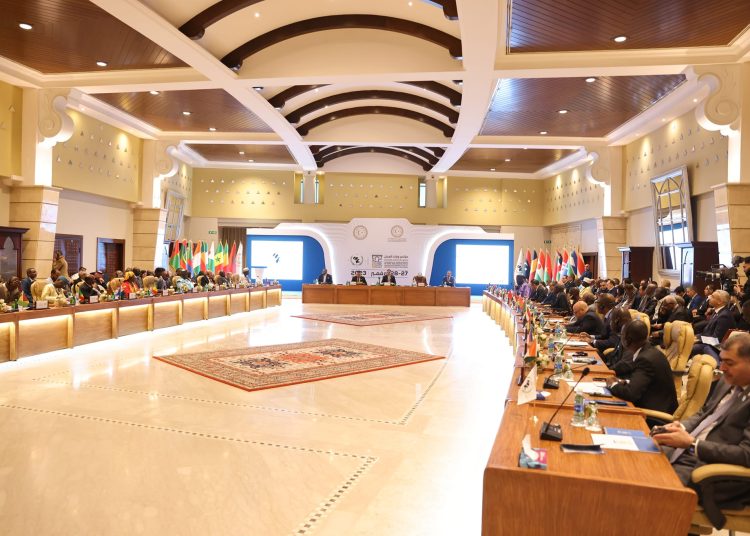The Conference of Labour Ministers of the Community of Sahel-Saharan states (Cen-Sad) (27-28 November) opened in Tripoli Monday.
The conference was held under the patronage of the Tripoli based Libyan Prime Minister, Abd Alhamid Aldabaiba, and under the supervision of the Minister of Labour and Rehabilitation, Ali Al-Abed.
Libya’s stability has impact on CEN-SAD
In his opening speech, Aldabaiba emphasised the vital role that Libya plays regionally and continentally, and the positive impact of its political stability on the rest of the countries of Cen-Sad. He called on the ministries of labour in Cen-Sad to work together to facilitate the movement of capital and exchange experiences and competencies, expressing Libya’s readiness to make Tripoli the headquarters of the Regional Labour Center, which is concerned with issues of employment, training, and care for expatriate workers.
Call on EU to do more on illegal migration at source
The Tripoli based Libyan Prime Minister also called on the European Union to make more efforts to address the issue of illegal immigration from its source by improving the living conditions of young people in African countries instead of relying solely on policies to prevent immigration, indicating the government’s readiness to implement any development programmes that serve the interest of the peoples of Africa and the Sahel-Saharan states.
CEN-SAD important for region
For his part, the Minister of Labor and Rehabilitation, Ali Al-Abed, stressed the importance of resuming Libya’s pioneering role regionally and continentally, despite the challenges, by supporting and activating the Sahel-Saharan Community as an important mechanism for enhancing cooperation among the peoples of the region.
Labour movement needs regulation to promote sustainable development
The Minister also stressed the need to regulate the issue of labour and its movement between the countries of the group, in a way that ensures the protection of workers’ rights and benefits the labour markets in the countries concerned. Pointing out that reducing the phenomena of unemployment and illegal immigration would contribute to promoting sustainable development for the societies of the Sahel-Saharan countries.
EU calls on countries of origin to do more
The European Union Ambassador to Libya, Nicola Orlando, stressed in his speech at the conference the suffering incurred by African migrants during their journey to Libya as a result of them falling prey to human smuggling gangs. He also warned of the spread of crime in Libya and its threat to the lives of residents and migrants alike.
EU ready to support countries of origin
Ambassador Orlando called on African countries of origin to make more efforts to prevent the migration of their citizens in irregular ways, while he welcomed the Libyan proposal to sign bilateral agreements to regulate the movement of labour. He also expressed the European Union’s welcome and readiness to support countries of origin in the areas of combating illegal immigration and sustainable development.
Unemployment in member states discussed
In its first session, the conference discussed the phenomenon of unemployment in member states and ways to address it. Each delegation gave a presentation on the reality of unemployment in its country and the solutions and initiatives used to address this problem. Ways of exchanging experiences and cooperation in the field of combating unemployment among the member states were also discussed.
Large African participation
Among the most prominent people who attended the conference were the Secretary-General of the Community of Sahel-Saharan States, delegations of labour ministries from the countries of Morocco, Tunisia, Somalia, Sierra Leone, Chad, Gambia, Mauritania, Ghana, Burkina Faso, Nigeria, and Ivory Coast, along with ambassadors from the countries of Chad, Djibouti, Niger, Comoros, Eritrea, Sudan, Egypt, Mali, and Senegal. Several ambassadors accredited to Libya from friendly countries attended: Turkey, France, Italy, Malta, Qatar, and Spain.
While from the Libyan side, in addition to the Prime Minister and the Minister of Labour, the Minister of Youth Fathi Al-Zani, the Minister of Finance Khaled Al-Mabrouk, and the Minister of State Adel Jumaa were present, along with several ministers and senior officials.
Conclusions to be discussed by a summit of leaders for action plan
The day’s activities concluded with the results of the discussions being summarized in recommendations that will later be submitted to the summit of leaders in the gathering, in preparation for developing a joint action plan to address the problem of unemployment and exchanging expertise and cadres between the Sahel and Sahara countries.








